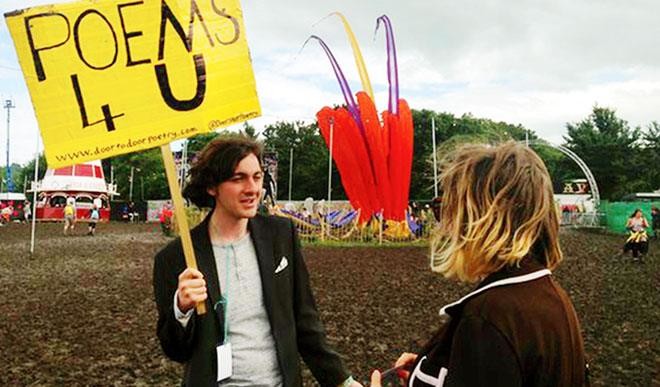The world’s first door-to-door poet
At this year’s singularly muddy Glastonbury, Rowan McCabe explained why he was delivering bespoke poetry to bedraggled campers In a damp Saturday afternoon in late June, a man wearing wellies and a blazer two sizes too big squelched around muddy fields in deepest Somerset, his pockets stuffed with business cards. He was carrying a yellow […]


At this year’s singularly muddy Glastonbury, Rowan McCabe explained why he was delivering bespoke poetry to bedraggled campers
In a damp Saturday afternoon in late June, a man wearing wellies and a blazer two sizes too big squelched around muddy fields in deepest Somerset, his pockets stuffed with business cards. He was carrying a yellow placard that said “Poems 4 U” and asking passersby at Glastonbury festival if they’d like to hear some verse. From his hands, strangers picked cards bearing words such as “curry” and “reggae” and “robots”. He then launched into a poem on the chosen topic. Meet Rowan McCabe, who pitches himself as “the world’s first door-to-door poet”.
McCabe is more usually found on the streets of Newcastle-upon-Tyne, writing bespoke verse for whoever happens to answer the buzzer when he calls. He’s penned poems about birds and love and parenting; one to remember a couple’s first date, another for someone’s dog. He composed the piece To Amy, Sitting Her Final Policing Exam for a future constable and Gospel for a woman he nicknamed Agnostic Ana.
At Glastonbury, McCabe performed selections from what he jokingly termed “my greatest hits”. But in Newcastle he turns up on strangers’ doorsteps and asks people what’s on their minds, interviewing them for details that might make it on to the page. He returns a week or two later, finished verse in hand, to perform it live. If the recipient isn’t home, he leaves a “sorry I missed you” note, and returns later to try again.
Part travelling salesman, part journalist, McCabe was the second person in his family to go to university and the first to carve out a career in the arts. “My family don’t get what I do,” he admits. “My one grandad was a miner and my other one was a docker. It’s strange to them that I’m not making something physical.” Yet poems can become a kind of object, and he likens writing one – which can be rapped aloud or read on the page – to assembling a jigsaw puzzle: “I can see the shapes fitting together.”
Now 25, he is “just about” making a living as an artist – leading poetry workshops for children, creating theatre (he performed his solo show North East Rising at last year’s Edinburgh fringe) and working on short films (he’s collaborating on a video for Channel 4’s Random Acts website). At poetry slams, he has performed humorous rants about Jamie Oliver and Cheryl Cole, and one piece dedicated to the late Patricia Tabram, who was known as “cannabis gran”. Last November, McCabe added door-to-door poet to his CV, and says: “I didn’t know if it would work, or if everyone would tell me to piss off.”
No one did, but not everyone wants to take part. On his first excursion, an older lady eyed him suspiciously, asked what he was selling, and when he explained that the poems were free, shut the door anyway. One burly, imposing man cut him off mid-sentence to say he wasn’t interested, but suggested McCabe go see his ex-wife at No 2.
Still, many people are surprisingly willing to share their stories. A pregnant woman told him her ex-partner was trying to convince her to have an abortion. She was the mother of two young boys and said that if she had a girl, she would be worried about how to teach her to combat the prejudice and sexism she might encounter. The exchange made McCabe think more deeply about what kind of father he might be.
McCabe posts the poems along with stories about his subjects on his blog, Door-to-Door Poetry. “I wanted to connect with people who might never have considered poetry before,” he says. “The heart of what I’m trying to do is open up a debate about strangers – what it means to connect with strangers, how scary they are…I want to prove that there are lots of different people in this country.”
Source: The Guardian UK
